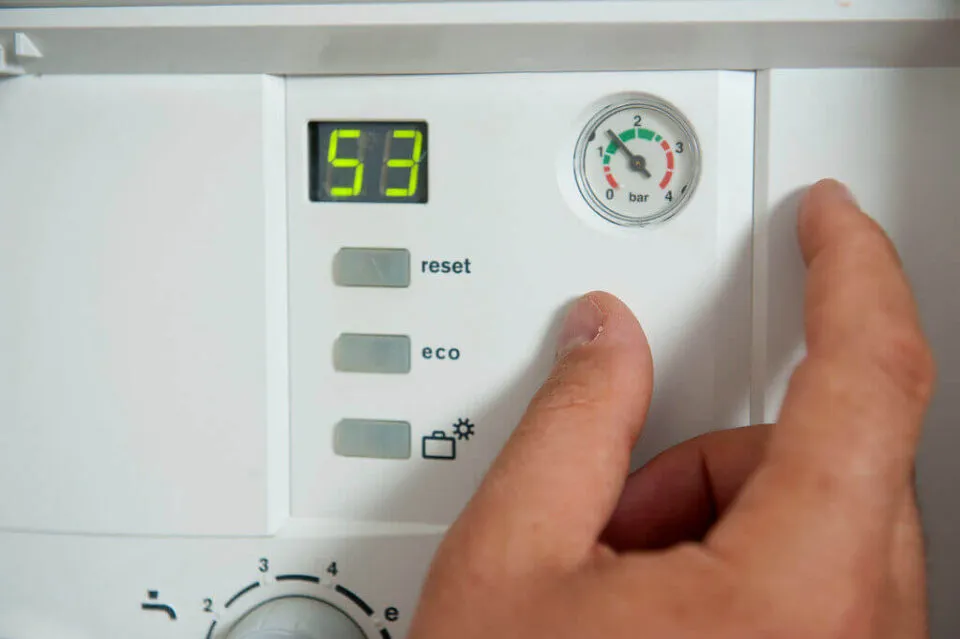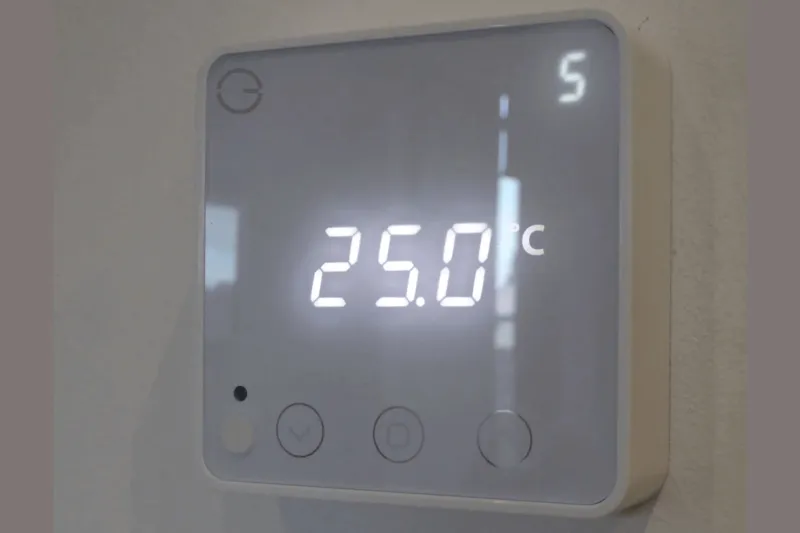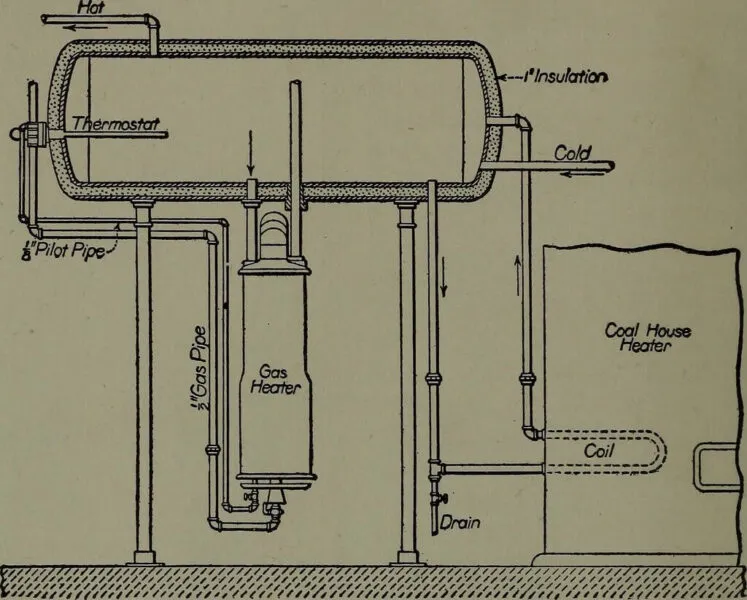Have you ever considered whether it’s worth installing a gas boiler in your apartment? Gas boilers heat your space faster and more efficiently than a superhero saving the day. And yes, that means your energy bills could pleasantly surprise you at the end of the month. But the story doesn’t end there.
Gas boilers become directors in the theater of automation. Their ability to adjust the temperature precisely and adaptively, eliminating the need for constant manual adjustments, adds a touch of modernity to the heating experience. Keep reading and discover how to implement autonomous heating with a gas boiler in an apartment building.
Why should you use a gas boiler? What benefits does it have?
Energy Efficiency
Modern gas boilers are known for their energy efficiency, converting fuel into heat more effectively than many traditional systems. This results in lower energy consumption and, consequently, lower long-term operating costs.
Constant Thermal Comfort
Autonomous heating with a gas boiler provides constant and uniform thermal comfort throughout the building. The ability to regulate the temperature precisely ensures that residents enjoy a warm and welcoming environment at all times.
Quick Response Time
Gas boilers offer fast response times, efficiently heating the space. This means residents experience fewer delays and quickly achieve the desired temperature in their homes.
Low Environmental Impact
Compared to some conventional heating systems, gas boilers tend to have a lower environmental impact. Modern technologies enable cleaner combustion, reducing emissions and contributing to environmental sustainability.
Control and Automation
Autonomous heating with a gas boiler allows precise temperature control in each housing unit. Advanced automation facilitates efficient system management, adapting to changing needs and optimizing energy performance.
Lower Long-Term Costs
Despite the initial investment, the efficiency and durability of gas boilers can result in lower operating costs over time. Proper maintenance extends the system’s lifespan, offering an attractive return on investment.
Versatility in Design
The system’s design versatility allows easy adaptation to different types of buildings. Whether in new constructions or renovation projects, gas boilers can integrate efficiently, offering architectural flexibility.
What types of gas boilers exist, and how do I know which is the best for me?
Types of Gas Boilers
Condensing Boilers
These boilers harness the latent heat of combustion gases, achieving higher energy efficiency by converting that heat into additional energy to heat the water. They are ideal for reducing operating costs and minimizing the environmental footprint.
Conventional or Sealed System Boilers
Also known as sealed system boilers, these extract the necessary air for combustion from the outside, making them safer and more efficient. They are a solid choice for those seeking performance and safety.
Low-Temperature Boilers
Designed to operate at lower temperatures than traditional boilers, these are efficient and environmentally friendly. However, their effectiveness may depend on installation and housing insulation.
How to Choose the Best Boiler for Your Apartment
Size of the Dwelling
Heating needs vary based on dwelling size. For smaller spaces, a lower-powered boiler may suffice, while larger properties may require a higher-capacity boiler for optimal comfort.
Energy Efficiency
Consider the boiler’s performance. Condensing boilers are often highly efficient, but the choice depends on priorities, whether energy efficiency, initial cost, or long-term savings.
Budget and Operating Costs
Evaluate the initial cost of the boiler and compare it with potential long-term savings. Condensing boilers, despite a higher initial price, often result in lower operating costs over time.
Hot Water Needs
If your apartment requires a significant amount of hot water, a boiler capable of providing a constant and efficient supply is essential. Condensing boilers typically excel in this aspect.
Planning the Installation Process
Before diving into the installation, meticulous planning is crucial. Determine the optimal location for the boiler, considering factors such as ventilation, gas supply, and accessibility for maintenance. Consult with a professional to ensure compliance with safety regulations and local building codes.
Sizing and Selecting the Right Boiler
Choosing the correct size and type of boiler is paramount for optimal performance. Conduct a heat load calculation to determine your home’s heating requirements. Select a boiler that matches these needs and aligns with your energy efficiency goals. Popular choices include combi boilers, system boilers, and conventional boilers.
Gas Supply and Ventilation
Ensure a reliable and sufficient gas supply to the boiler location. Work with a certified gas engineer to assess the gas line’s capacity and make any necessary upgrades. Adequate ventilation is critical to prevent carbon monoxide buildup. Install vents or flues according to manufacturer specifications and local regulations.
Boiler Installation
The actual installation process begins with mounting the boiler on a secure, level surface. Connect the water and gas lines following the manufacturer’s instructions. Install any required accessories, such as expansion tanks and pressure relief valves. Ensure proper sealing and insulation to enhance energy efficiency.
Connecting to the Heating System
Integrate the boiler into your heating system by connecting it to the radiators or underfloor heating. Install thermostatic radiator valves for precise temperature control. If your boiler includes a hot water cylinder, connect it to the system, considering the location and insulation to minimize heat loss.
Commissioning and Testing
Once installed, commission the boiler by checking for leaks, bleeding air from the system, and ensuring proper pressure levels. Conduct a series of safety and performance tests to guarantee the system’s functionality. It’s advisable to hire a qualified engineer for this crucial step to avoid any oversight.
User Guidance and Maintenance
Provide clear instructions to users on operating the boiler efficiently and safely. Create a maintenance schedule, including regular checks, cleaning, and servicing. Regular maintenance ensures the longevity of the system and helps identify and address issues before they escalate.
Understanding Zoning Dynamics
Zoning isn’t a mere technicality; it’s your secret weapon for ultimate comfort. Imagine having a cozy living room while maintaining a slightly cooler temperature in the bedroom for a perfect night’s sleep. Zoning allows you to divide your home into heating zones, ensuring each space is just as warm or cool as you desire.
Consider the ‘SmartZone Ultra’ system, which allows you to create customized heating schedules for each room, adapting to your daily routine seamlessly.
Selecting Zoning Marvels for Your Space
Choosing the right zoning equipment is pivotal for success. For water-based systems, zone valves like the ‘HydroControl Pro’ excel, while forced-air systems benefit from dampers such as the ‘AirFlow Master.’ Embrace smart zoning with solutions like ‘ZonoTech Connect’ for remote control and energy optimization.
Explore the ‘Zonal Bliss’ package that combines zone valves with a smart thermostat, providing both convenience and energy efficiency.
Crafting Your Heating Haven with Zoning
As you plan your heating zones, think practically. Designate zones based on usage – living areas, bedrooms, and spaces with specific needs. Picture a ‘Night Zone’ where bedrooms are slightly cooler, creating an ideal sleeping environment.
Install the ‘RoomSync Sensor’ in bedrooms, allowing the thermostat to adjust based on occupancy, ensuring optimal comfort during nighttime.
Choosing Thermostats Tailored to You
The thermostat is your control center, and the market is brimming with options. Opt for a smart thermostat like the ‘EcoComfort Plus,’ offering intuitive programming, energy-saving features, and compatibility with various zoning systems.
Experience the ‘SmartTemp Pro,’ equipped with learning capabilities, adapting to your preferences and predicting your heating needs over time.
Strategic Thermostat Placement
Perfect placement ensures accurate readings. Avoid spots with direct sunlight or heat sources. Invest in smart thermostats with built-in sensors, like the ‘SensiSense,’ which adjusts temperatures based on occupancy and ambient conditions.
The ‘SenseFlow Max’ comes with a remote sensor that you can place strategically in colder areas, ensuring a balanced temperature throughout the zone.
Installation: DIY or Professional Assistance
When it comes to wiring and installation, follow guidelines meticulously. For those less inclined toward DIY, professionals can effortlessly set up systems like the ‘EasyHeat Install’ service, ensuring a seamless and secure process.
Explore the ‘InstaHeat Service,’ where certified technicians handle the entire installation, guaranteeing a worry-free experience.
Fine-Tuning Your Personalized Climate
Programming is where the magic happens. Smart thermostats, such as the ‘TechSavvy Elite,’ learn your routine, optimizing heating schedules for maximum efficiency.
Enable the ‘Vacation Mode’ on the ‘TempControl Ultra’ before leaving, ensuring your home is efficiently heated only when necessary.
Real-World Testing and Ongoing Optimization
Post-installation, conduct thorough testing to fine-tune settings. Regularly optimize your system based on performance. The ‘OptiHeat Analyzer’ is a tool that provides real-time data on energy usage, empowering you to make informed adjustments.
Utilize the ‘EnergyWatch App’ that pairs with your thermostat, offering insights into energy consumption and personalized tips for optimization.


